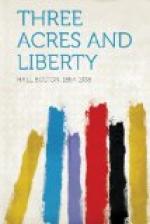Don’t be hypnotized by long experience or by success. Hardly anybody knows his own business. You must have noticed that few of the people you buy of or sell to, know any more of their goods than you do.
It is just the same with trades. Hardly a barber knows that he should not shave you against the grain of the skin. Even the cat won’t stand being rubbed up the wrong way; but the barber never thought of that.
We lawyers and the doctors are supposed to be thorough in our own field—I said lately to one of the ablest men at the New York Bar, “About one lawyer in a hundred knows his business.” He said, “That is a gross overestimate.” Shortly after I talked with three Judges, one of the City Court, one of the Supreme Court, and one of the United States Circuit, and they each agreed that my friend’s remark was about true, and that in most cases litigants would do as well without lawyers as with them.
If that is true, what chance is there that an uneducated man who has “raised garden sass ever since he was a boy, and seen his father do it before him,” can teach you correctly?
Men learn very slowly by experience, because no two experiences are exactly alike, unless they perceive and apply the principles under the experience.
An intelligent man accustomed to investigation can learn more about a specialty in a week’s study than an untrained practitioner can believe in a year.
What the untrained teacher can tell us is of little account; what he shows us is another matter.
Therefore get help who know that they don’t know anything about a garden and who consequently will do with a will exactly what you tell them to do; such labor is cheap—why should you pay extravagant prices for skill to a man who has succeeded so poorly that he can only earn day’s wages? You can get much better knowledge at less cost from a book. Study and put your knowledge into practice yourself, where you see promise of a profit.
Almost every crop can be made a specialty. In proportion as special crops are profitable when conditions are right, so are they sources of loss when things go wrong. If, after your first season in the country, some special crop takes your fancy, give extra space and time to it the second year and see if you are successful in handling an eighth or a quarter acre. If so, you may extend your operations as rapidly as purse and market permit.
Before concentrating upon any crop as the chief source of income, a careful study must be made of all the conditions surrounding its production; a crop is not produced in the broad meaning of that term until it is actually in the hands of the consumer.
Potatoes, for instance, are grown by the hundred acres in sections adapted to their growth, and special machinery costing hundreds of dollars is used in planting, cultivating, and harvesting the crop. The good shipping and keeping qualities of the potato enable it to be raised far from markets and so brings into competition cheap land worked in large areas, with large capital. In spite of this, however, the small cultivator can usually make money if he can sell his potatoes directly to the consumer.




